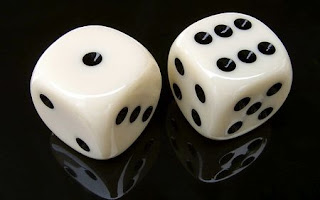Most of the posts I have shared thus far have been rather heavy or heady, but I would also like this blog to be about more concrete considerations and applications. As a first stab in that direction, here are some thoughts on how to turn your luck around or get over writer's block from the view point of Carlos Castaneda and Aleister Crowley.
The magician
Aleister Crowley had a trick for turning his luck around whenever he felt it
was necessary. He often used this same trick when he was suffering from
writer’s block and felt he needed a new influx of inspiration. The trick is
surprisingly simple: do something you
would never normally do.
The occultist and philosopher Carlos
Castaneda presents a similar idea in the books that chronicle his study of
Toltec mystical practices. There we find presented the idea of Stalking which, ultimately, is short
hand for Stalking Oneself. The way
one stalks oneself is by becoming aware of those habitual behaviors which keep
most of our personal energy bound up in repetition. By breaking these habits we
free the energy they had monopolized. We also force a change in our own
awareness of reality, as our habitual behaviors constitute the most resilient,
and generally unconscious, framework that maintains our constant perspective on
reality. This may be the explanation why Crowley’s trick works. What the Toltec
practice of Stalking adds to
Crowley’s trick is the realization that there can be as much power in little
actions as large ones. What follows is a non-exhaustive list of suggestions for
how to turn one’s luck:
1.
Change
your Daily Routines for a day: If you are an early riser wake up late, if
you tend to be late to appointments force yourself to be early. Change when you
shower. Eat your lunch in a different location. Go for a walk when you usually
watch television. Be less polite, or more polite and friendly, than normal.
2.
Change
your Bodily Behavior for a day: Walk faster or slower than you usually do.
Stand closer to people when talking to them than is comfortable for you. Make a
point of standing straighter, or slouching, all day. Look people in the eye or
refuse to look people in the eye. Hold your feet perfectly parallel to each
other as you walk.
3.
Modify
your Appearance: Wear clothing you would never normally wear, change your
hair, wear glasses rather than contacts. These can also be semi-permanent
modifications. I once got a piercing as a way of turning my luck (I had never
before modified my body in such a way). This also would count as an example of
#4.
4.
Perform
Uncharacteristic Actions: This is primarily what Crowley had in mind. These
tend to be more dramatic singular actions rather than extended behaviors.
Potential actions include taking risks you normally avoid or vise-versa, doing
something you find morally reprehensible or something you find virtuous but
have always lacked the time or courage for, performing a sexual act you would
never normally imagine partaking in. The key to these actions has to be their
incongruity with who you take yourself, and others take you, to be. My going
out and getting a piercing was, at the time, utterly unthinkable to most people
who knew me and similarly unthinkable to me. These actions can sometimes appear
as a form of self-indulgence, but it is important that they have the right
element of surprise. You are, in effect, attempting to surprise yourself
through your own actions. It is also worth noting that moral considerations can
be a trap here, despite my including them in the list above. The point of this
exercise is not to make a positive change in your life, it is to free yourself
from the chains of habit and self-conception. This often means doing something
that is not, on the surface, good or good for you. However, in a deeper sense, escaping from old habits and self-conceptions can be understood as good in and of itself.


No comments:
Post a Comment